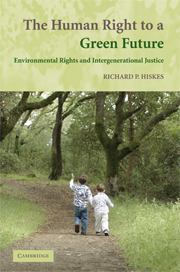Book contents
- Frontmatter
- Contents
- Acknowledgments
- Introduction
- 1 Environmental Human Rights and Intergenerational Justice
- 2 Emergent Human Rights, Identity, Harms, and Duties
- 3 Reflexive Reciprocity and Intergenerational Environmental Justice
- 4 Cosmopolitan Ethics, Communal Reciprocity, and Global Environmentalism
- 5 Toward a Global Consensus on Environmental Human Rights
- 6 Human Rights as Inheritance: Instituting Intergenerational Environmental Justice
- 7 Conclusion: Environmental Justice and the Emergent Future of Human Rights
- References
- Index
5 - Toward a Global Consensus on Environmental Human Rights
Published online by Cambridge University Press: 01 July 2009
- Frontmatter
- Contents
- Acknowledgments
- Introduction
- 1 Environmental Human Rights and Intergenerational Justice
- 2 Emergent Human Rights, Identity, Harms, and Duties
- 3 Reflexive Reciprocity and Intergenerational Environmental Justice
- 4 Cosmopolitan Ethics, Communal Reciprocity, and Global Environmentalism
- 5 Toward a Global Consensus on Environmental Human Rights
- 6 Human Rights as Inheritance: Instituting Intergenerational Environmental Justice
- 7 Conclusion: Environmental Justice and the Emergent Future of Human Rights
- References
- Index
Summary
Think not forever of yourselves, O Chiefs, nor of your own generation. Think of continuing generations of our families, think of our grandchildren and of those yet unborn, whose faces are coming from beneath the ground.
Peacemaker, Founder of the Iroquois ConfederacyOur consideration in the last chapter of nationalism within a globalized world of human rights and environmental obligations reveals a paradox within current human rights thinking and application. Human rights theory and practice today manifest both an increasing global consensus on human rights as a category of legitimacy, while at the same time expressing a “third-generation” insistence on honoring the diversity of individual cultures and their right to maintain their historic norms. On the one hand, Jack Donnelly (2007, 282) insists that human rights “have become ideologically hegemonic in international society. Not only do few states today directly challenge international human rights, a surprisingly small number even seriously contend that large portions of the Universal Declaration [of Human Rights] do not apply to them.” Conversely, James N. Rosenau (2002, 153) notes what he calls the “fragmentation” of human rights as they are “localized” into the many specific cultures once devoid of any sensitivity to the idea of rights. As Michael Ignatieff (1999) concludes, “human rights has gone global, but it has also gone local.”
In terms of the argument for environmental human rights and intergenerational justice that I have presented thus far, this paradox of globalism and parochialism has an interesting manifestation.
- Type
- Chapter
- Information
- The Human Right to a Green FutureEnvironmental Rights and Intergenerational Justice, pp. 92 - 116Publisher: Cambridge University PressPrint publication year: 2008



